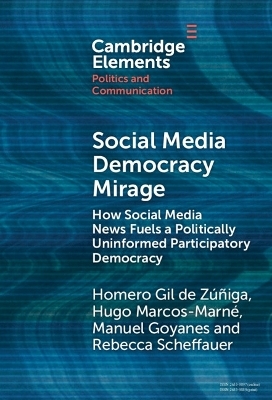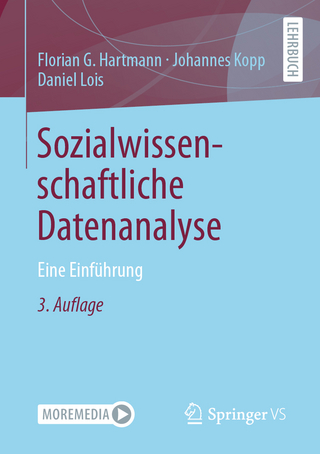
Social Media Democracy Mirage
How Social Media News Fuels a Politically Uninformed Participatory Democracy
Seiten
2024
Cambridge University Press (Verlag)
978-1-009-50086-9 (ISBN)
Cambridge University Press (Verlag)
978-1-009-50086-9 (ISBN)
- Lieferbar (Termin unbekannt)
- Versandkostenfrei innerhalb Deutschlands
- Auch auf Rechnung
- Verfügbarkeit in der Filiale vor Ort prüfen
- Artikel merken
Social media was expected to provide new opportunities for people to learn about politics and public affairs. This Element contends that social media has produced a Social Media Democracy Mirage. Social media have led to a socio-political paradox in which people are more participatory than ever, yet not necessarily more informed.
For over two decades, political communication research has hailed the potentially reinvigorating effect of social media on democracy. Social media was expected to provide new opportunities for people to learn about politics and public affairs, and to participate politically. Building on two systematic literature reviews on social media, and its effects on political participation and knowledge (2000–2020), and introducing empirical evidence drawing on four original US survey data that expands for over a decade (2009–2020), this Element contends that social media has only partially fulfilled this tenet, producing a Social Media Democracy Mirage. That is, social media have led to a socio-political paradox in which people are more participatory than ever, yet not necessarily more informed.
For over two decades, political communication research has hailed the potentially reinvigorating effect of social media on democracy. Social media was expected to provide new opportunities for people to learn about politics and public affairs, and to participate politically. Building on two systematic literature reviews on social media, and its effects on political participation and knowledge (2000–2020), and introducing empirical evidence drawing on four original US survey data that expands for over a decade (2009–2020), this Element contends that social media has only partially fulfilled this tenet, producing a Social Media Democracy Mirage. That is, social media have led to a socio-political paradox in which people are more participatory than ever, yet not necessarily more informed.
1. Introduction; 2. Systematic literature review: social media and political participation; 3. Systematic literature review: social media and political knowledge; 4. More participation and less political learning; 5. Final conclusions; Appendix; References.
| Erscheinungsdatum | 10.12.2024 |
|---|---|
| Reihe/Serie | Elements in Politics and Communication |
| Zusatzinfo | Worked examples or Exercises |
| Verlagsort | Cambridge |
| Sprache | englisch |
| Themenwelt | Mathematik / Informatik ► Informatik |
| Sozialwissenschaften ► Kommunikation / Medien ► Medienwissenschaft | |
| Sozialwissenschaften ► Politik / Verwaltung ► Politische Systeme | |
| ISBN-10 | 1-009-50086-4 / 1009500864 |
| ISBN-13 | 978-1-009-50086-9 / 9781009500869 |
| Zustand | Neuware |
| Informationen gemäß Produktsicherheitsverordnung (GPSR) | |
| Haben Sie eine Frage zum Produkt? |
Mehr entdecken
aus dem Bereich
aus dem Bereich
Eine Einführung
Buch | Softcover (2022)
Springer VS (Verlag)
32,99 €
wie KI und virtuelle Welten von uns Besitz ergreifen – und die …
Buch | Hardcover (2023)
Heyne (Verlag)
22,00 €


